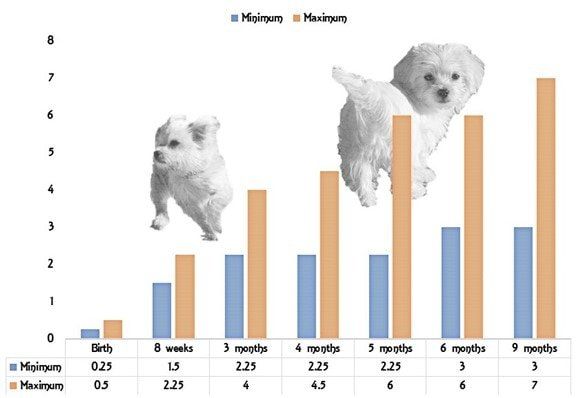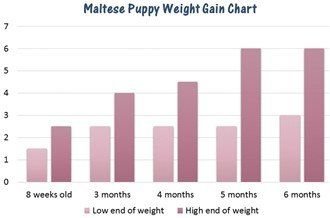Ever wondered how much a Maltese weighs when fully grown? Well, get ready to be amazed. Despite their small size and delicate appearance, these fluffy little dogs can actually weigh up to 7 pounds (3.2 kilograms) when fully grown! It’s hard to believe that so much cuteness can be packed into such a tiny package.
The weight of a Maltese dog when fully grown can vary a bit depending on various factors such as genetics, diet, and exercise. However, on average, a full-grown Maltese will typically weigh between 4 to 7 pounds (1.8 to 3.2 kilograms). Despite their small stature, these dogs have a long and rich history, with their origins traced back to the Mediterranean island of Malta. They were once highly prized by nobility and were even believed to have healing powers. If you’re considering getting a Maltese, it’s important to provide them with a balanced diet and regular exercise to maintain their ideal weight and keep them healthy and happy.
Discovering a Maltese’s weight as an adult can be intriguing! As a miniature breed, Maltese dogs typically weigh between 4 to 7 pounds when fully grown. These adorable furballs maintain their petite size while displaying immense charm and elegance. While individual differences exist, providing proper nutrition and regular exercise will help your Maltese maintain a healthy weight. Embrace the joy of owning a compact, lovable companion with the perfect weight to cuddle!
-330x218-960w.jpg)
How Much Does a Maltese Weigh Full Grown?
A Maltese is a small and adorable breed of dog that is known for its long, flowing white coat and playful personality. If you’re considering getting a Maltese as a pet, one of the questions you may have is, “How much does a Maltese weigh when fully grown?” In this article, we will explore the average weight range for adult Maltese dogs, factors that can affect their weight, and tips for maintaining a healthy weight for your furry friend.
Factors That Influence the Weight of a Maltese
While the Maltese breed has certain standards for weight, it’s important to understand that individual dogs may deviate from these standards based on a variety of factors. Here are some factors that can influence the weight of a Maltese:
1. Genetics
The weight of a Maltese is largely determined by its genetics. If the parents of a Maltese puppy are on the smaller side, it is likely that the puppy will also be smaller in size and weight. Conversely, if the parents are larger, the puppies will likely be bigger as well. However, genetics are not the sole determining factor for adult Maltese weight.
2. Gender
Gender can also play a role in the weight of a Maltese. Typically, male Maltese dogs tend to be slightly larger and heavier than females. However, the difference in weight between males and females is usually minimal.
3. Age
Like humans, dogs go through different stages of growth, and their weight can vary depending on their age. A Maltese puppy will naturally weigh less than an adult Maltese. It’s important to monitor their weight as they grow and adjust their diet and exercise accordingly.
4. Diet and Exercise
The diet and exercise routine of a Maltese can greatly impact their weight. If a Maltese is overfed and lacks exercise, they may become overweight or obese. On the other hand, if they are not getting enough food or exercise, they may be underweight. It is essential to provide a balanced diet and engage in regular physical activity to ensure a healthy weight for your Maltese.
5. Health Conditions
Sometimes, underlying health conditions can affect a Maltese’s weight. Conditions such as hypothyroidism or Cushing’s disease can cause changes in appetite and metabolism, leading to weight fluctuations. If you notice any unusual weight changes in your Maltese, it is best to consult with a veterinarian to rule out any underlying health issues.
6. Neutering or Spaying
Neutering or spaying a Maltese can also affect their weight. After the procedure, some dogs may experience a decrease in their metabolism, which can lead to weight gain if their calorie intake is not adjusted accordingly. It’s important to consult with a veterinarian to determine the appropriate diet and exercise plan for your Maltese after the procedure.
Weight Range for Adult Maltese Dogs
While there is no set weight that applies to all adult Maltese dogs, there is an average weight range that is considered typical for the breed. On average, adult Maltese dogs typically weigh between 4 to 7 pounds (1.8 to 3.2 kilograms). However, it is not uncommon to find Maltese dogs that weigh slightly less or slightly more than this range.
Tips for Maintaining a Healthy Weight for Your Maltese
To ensure that your Maltese maintains a healthy weight, consider the following tips:
1. Balanced Diet
Provide your Maltese with a balanced diet that is appropriate for their age and activity level. This should include high-quality dog food that is rich in nutrients and free from artificial additives. Consult with your veterinarian to determine the best diet for your Maltese.
2. Portion Control
Avoid overfeeding your Maltese and practice portion control. Follow the feeding guidelines provided on the dog food packaging and adjust the portion size based on your Maltese’s individual needs. Avoid giving excessive treats or table scraps, as they can contribute to weight gain.
3. Regular Exercise
Engage your Maltese in regular exercise to help them burn off excess energy and maintain a healthy weight. Daily walks, interactive play sessions, and mentally stimulating activities can help keep your Maltese active and fit.
4. Monitor Weight
Weigh your Maltese regularly to track their weight and ensure they are within the healthy range. If you notice any significant weight changes, consult with your veterinarian for guidance.
5. Regular Veterinary Check-ups
Bring your Maltese for regular veterinary check-ups to monitor their overall health, including their weight. Your veterinarian can provide guidance on maintaining a healthy weight and address any concerns or issues related to your Maltese’s weight.
Conclusion
The weight of a fully grown Maltese can vary based on factors such as genetics, gender, age, diet, exercise, and health conditions. While the average weight range for adult Maltese dogs is 4 to 7 pounds, individual dogs may fall slightly below or above this range. It is important to provide a balanced diet, monitor portion sizes, ensure regular exercise, and consult with a veterinarian to maintain a healthy weight for your furry friend. By taking these measures, you can ensure that your Maltese remains happy, healthy, and at a weight suitable for their breed.
Key Takeaways: How Much Does a Maltese Weigh Full Grown?
2. However, some Maltese dogs can weigh slightly more, up to 8 pounds.
3. The weight of a Maltese can be influenced by factors such as genetics and diet.
4. Maltese puppies are tiny and may only weigh a few ounces at birth.
5. Regular exercise and a balanced diet are important for maintaining a healthy weight for your Maltese.
Frequently Asked Questions
Welcome to our FAQ section where we answer some common questions about the weight of a full-grown Maltese. If you’re curious about how much these adorable little dogs weigh when they reach adulthood, you’ve come to the right place!
1. How much does a fully grown Maltese typically weigh?
On average, a full-grown Maltese weighs between 4 to 7 pounds. However, it’s important to consider that individual dogs can vary in size and weight. Some Maltese may weigh slightly less or more depending on factors such as genetics, diet, and exercise.
Remember, every dog is unique, so it’s best to consult with a veterinarian to ensure your Maltese is at a healthy weight and size for their specific breed standards.
2. Are there any factors that can influence the weight of a full-grown Maltese?
Yes, there are several factors that can influence the weight of a full-grown Maltese. Genetics play a significant role in determining the size and weight of a dog. If the parents of a Maltese were smaller or larger than average, it can affect the adult weight of their offspring.
Diet and exercise also play a crucial role. Overfeeding or providing an unbalanced diet can lead to excessive weight gain, while insufficient exercise can contribute to weight-related issues. It’s important to maintain a healthy diet and exercise routine for your Maltese to help them stay within the ideal weight range.
3. How can I ensure my Maltese stays at a healthy weight?
To ensure your Maltese stays at a healthy weight, it’s essential to provide them with a balanced diet recommended by a veterinarian. Measuring their food portions and avoiding excessive treats can help prevent overfeeding. Regular exercise, such as daily walks and playtime, is also crucial for maintaining their weight and overall well-being.
Monitoring your Maltese’s weight regularly and consulting with a veterinarian can help you assess their progress and make any necessary adjustments to their diet or exercise routine.
4. Can an underweight or overweight Maltese face health issues?
Yes, both underweight and overweight Maltese dogs can experience health issues. An underweight Maltese may lack proper muscle and fat reserves, making them more susceptible to infections, hypoglycemia, and a weakened immune system. On the other hand, an overweight Maltese can be at risk for obesity-related health problems such as joint issues, diabetes, and heart disease.
It’s crucial to maintain a healthy weight for your Maltese by following a balanced diet, providing regular exercise, and seeking veterinary guidance if you have concerns about their weight.
5. At what age is a Maltese considered fully grown?
A Maltese is generally considered fully grown at around 12 months of age. However, their growth and development may vary. Some Maltese may reach their full adult weight and size sooner, while others may take slightly longer.
It’s important to provide proper nutrition and care during their development stages to support healthy growth. Regular check-ups with a veterinarian can ensure that your Maltese is progressing as expected and help you address any concerns or questions along the way.

Summary
Here’s what you learned about how much a Maltese weighs when fully grown! Maltese dogs usually weigh between 4 and 7 pounds. Their size is influenced by genetics and their diet and exercise habits. It’s important to take care of your Maltese’s health and remember that every dog is unique!
